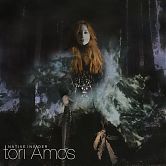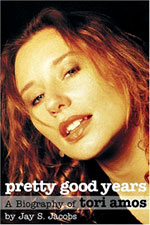- Articles
- Cherries
- Minutiae
- Q&A
- RAINN
- Releases
- Reviews
- Site News
- Them
- Toriphiles
- Touring
- TV/Radio/Web
- Video
News Archives
Keep an eye on our Twitter and Facebook pages since we often post quickie updates there when we're on-the-go.
During tours, we do our best to cover setlists in real-time on Twitter. If you want to tweet a show in, just DM or @ us on the day and tell us to watch your stream that night.
Tori is touring in 2017 to support the release of Native Invader. The European legs runs from early September through early October and the North American leg runs from late October to early December. We do not know if additional dates elsewhere will be added.

Native Invader (album, 2017)

Unrepentant Geraldines (album, 2014)

Gold Dust (album, 2012)

Night of Hunters (album, 2011)

Midwinter Graces (album, 2009)
 Abnormally Attracted To Sin (album, 2009)
Abnormally Attracted To Sin (album, 2009)
Live at Montreux 1991/1992 (DVD, 2008)

American Doll Posse (album, 2007)

A Piano (boxed set, 2006)

Pretty Good Years
(bio, 2006)

Fade To Red
(DVD, 2006)
 Comic Book Tattoo (book, 2008)
Comic Book Tattoo (book, 2008)News: Rolling Stone Interview And Song Premiere (September 18, 2012)
For this record, these “song-girls” have passports, they’ve been around the world. I’ve met a lot of people, who in turn told me their stories about my music, so each song has endless Polaroids attached to it. It’s been building over the years.
Rolling Stone kicked off the promotion for Gold Dust in earnest with a lengthy interview which addresses key points about the record from building context for the collection to song selections. Perhaps of greater interest though is that two full songs from the album, “Silent All These Years” and “Gold Dust,” are included with the interview for everyone’s listening pleasure! So while reading the interview, check out the songs on Rolling Stone’s Hear It Now player.
Thanks to filmbuff83 and Pagan Poet for the link!
Song Premiere: Tori Amos, ‘Silent All These Years’ and ‘Gold Dust’
Singer revisits her catalog with the Metropole Orchestra
By Jillian Mapes
September 18, 2012 8:00 AM ET
Click to listen to Tori Amos’ ‘Silent All These Years’ and ‘Gold Dust’
“I seem extroverted but I’m incredibly introverted,” Tori Amos says in an articulate whisper. She’s sitting in a light-filled Tribeca apartment explaining why, after a life spent performing, it was a thoroughly nerve-racking experience recording her new album, Gold Dust (due October 2nd). The album – Amos’ second foray into classical music, following 2011’s Night of Hunters – reads like a scrapbook of her career, comprising old favorites reworked with orchestration from the Metropole Orchestra.
It wasn’t revisiting her discography so much as the orchestra itself that intimidated Amos during the album’s recording, which saw her tracking her vocals in front of the nearly 60-piece Dutch orchestra (whom Amos first performed live with in 2010) and personnel from her label (Deutsche Grammophon). “I sing about some of these very intimate moments in my life, and a lot of them written before I got married to Mark [Hawley, also her sound engineer], and he’s there and everyone knows,” she says. “It was walking into a room full of people and baring your most intimate thoughts to after barely saying hello.”
With the premiere of two songs from the album – title track “Gold Dust” (originally off 2002’s Scarlet’s Walk) and “Silent All These Years” (from her breakthrough 1992 solo debut, Little Earthquakes) – Rolling Stone sat down with Amos to discuss song choices and revisiting Little Earthquakes 20 years later.
Your voice sounds stronger on a lot of the songs on Gold Dust. Is that because you’re reacting to the orchestra playing with you, or is it because you have distance from these songs now?
There’s a rigidity that goes. When you’ve composed something, and you’re trying to get it right, you’re making certain decisions about the performance of it. But once you’ve been playing some of these songs for 20 years, you allow yourself to have different inflections. It doesn’t have to be sung the same way. You can kind of free yourself.
Obviously Gold Dust isn’t a greatest hits compilation, but it does span your entire career. How did you approach song selection?
This is about casting songs that would really lend themselves to orchestration. People were warning me about records where artists had worked with an orchestra and they felt that something was lost – diluted and nothing was gained. I thought, “We have to retain the essence of who these ‘song-girls’ are.” But yet, we have to also think about how to create a narrative where they can live together. A lot of this was about picking songs that had different subject matter but could live in the world and feel as though they’re a complete album.
Some wanted to come, and it became about time. “Hey Jupiter” was there floating around, but she was there on the tour with the quartet so an arrangement was done. And you’ll be seeing her – she’ll show up live. But we didn’t have that ready for the recording with Metropole. I chose to do “Gold Dust” instead, which is a very complex piece. I felt I needed something that could work as an album title and a flagship song that would explain what the work is, to hold all the other ones and to treat this like a memory box.
Looking back to Little Earthquakes, 20 years later and now reworking some of these songs for the new album, how has your emotional relationship with the record changed?
I actually have relationships with these songs now. On the original record, I’d barely seen the songs three-dimensionally yet. Now it’s triggered because of an experience that brings back a memory, or a conversation you were having with someone. It takes you there immediately, and you can tap into that song consciousness – the “song-girls.” For this record, these “song-girls” have passports, they’ve been around the world. I’ve met a lot of people, who in turn told me their stories about my music, so each song has endless Polaroids attached to it. It’s been building over the years.
When I began playing with the orchestra, I began seeing new pictures. A good example of that is with “Winter” [off Little Earthquakes]. I began to see not me running over that hill, but there was a picture of Mark and Tash [Amos’ daughter, Natashya] in Vienna. She was a little girl, two or three, and she had fallen on the ice. He picked her up and she was crying because she had hurt her little knee through her tights. There was a moment where she put her hand in her dad’s and I just thought, “I’m not the little girl in the picture anymore – and that’s OK.”
I imagine you’ve heard many stories involving the songs you’ve written about rape. What stories come to mind with “Silent All These Years” besides your own?
There have been women who I’ve met over the years, from all walks of life. One I remember being a judge and in a domestically violent relationship. She was at a crossroads because she didn’t want it exposed, that she was such a powerful woman in her day-to-day life yet she continued to stay in a relationship like this. She would go out in the day and revel in who people thought she was – fair and judicious – and yet, so unfair with herself in her personal life. She said that “Silent All These Years” was giving her the strength to make changes in her life.
Years later, when I played Israel, I was in an airport bathroom when a Middle Eastern woman came up to me. She said, “Don’t think we’re not listening. We pass your music behind closed doors to each other and it’s something secret that we know, so don’t stop.” “Silent All These Years” was one of the songs that she mentioned. In those moments, it puts in perspective the twentysomething in me, who was more focused on the charts than the power of music. I just didn’t comprehend the value in my mind of a Middle Eastern woman stopping me and saying that to me: “Don’t stop.”


